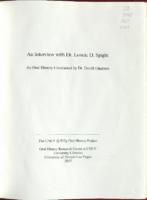Search the Special Collections and Archives Portal
Search Results

Transcript of interview with Dr. Lonnie D. Spight by Dr. David Emerson, May 8, 2007
Date
Archival Collection
Description
Text

Qiong Liu interview, June 8, 2016: transcript
Date
Archival Collection
Description
Interviewed by Claytee White. Dr. Liu is the City Manager for the City of North Las Vegas. Discusses housing, diversifying the economy, Apex, Faraday and negotiations to secure that business for North LV.
Text

Transcript of interview with Melanie Greenberg by Barbara Tabach, June 14, 2016
Date
Archival Collection
Description
When Melanie Greenberg was a young girl in her hometown of Kansas City, Missouri, she thinks it is likely that she crossed paths with her future husband at Hebrew School. However, it would be years later in college when they officially met – and fell in love and married in 1970. By 1976, Missouri was in the rearview mirror and career opportunities for her husband Gene Greenberg would lead them to Las Vegas. With their 18-month-old daughter Sari, they drove into Las Vegas for the first time, down Boulder Highway to Flamingo Road. Gene’s employer had arranged for a room at the Flamingo Hotel. As she explains, there many have been a better route, but it brought them to town and they stayed, raised their family, and became fixtures in the community since that moment. Among their first goals was finding a synagogue. Melanie’s magical touch has been felt in many places within the Las Vegas Jewish community: an active member of Temple Beth Sholom, the Jewish Federation’s Young Leadership and Women’s programs, organizer of Hebrew High, coordinator of L’Dor V’Dor activities for seniors, and Executive Director of Hillel from 1996 – 2003.
Text

Hildred Meidell interview, February 27, 1979: transcript
Date
Archival Collection
Description
On February 27, 1979, collector Greg Abbott interviewed Hildred Meidell (b. March 17, 1900 in Webb City, Missouri) about her time living in Las Vegas, Nevada. Meidell covers a range of topics, from her and her husband’s time as tourists in the city and their subsequent retirement to Las Vegas from Los Angeles, California. Meidell describes the Las Vegas Strip, the interstate and highway conditions between Los Angeles and Las Vegas, as well as their numerous visits to Hoover Dam (Boulder Dam). Moreover, she speaks about the changing layout of the city, the increase in shopping centers and department stores, and the clothing stores inside of hotels. Lastly, Meidell talks about the prominence of churches in local communities, the atomic testing program and the structural damages these tests caused in her neighborhood, and the influence of the railroad and passenger train on the town.
Text

Jack L. Monroe Jr. interview, March 15, 1981: transcript
Date
Archival Collection
Description
On March 15, 1981, Marie Carmichael interviewed Jack L. Monroe Jr. (b. 1937 in St. Helena, California) about his life in Las Vegas, Nevada and his work as a cook among many other topics. Monroe speaks initially about his time working alongside his family in the restaurant business, with his father working as a cook, his mother a waitress and himself as both a busboy and a cook. He discusses the working conditions of cooks, the competition between casino restaurants and the relationship between workers, bosses and the public. Moreover, Monroe speaks about life in Las Vegas as a youngster, the significance of YMCA, summer camps and other recreational activities, and the school system. Lastly, he talks about the changing infrastructure of the city, the paved roads and public transportation, how casinos made their profits and the attachment residents develop towards the city of Las Vegas.
Text

Transcript of interview with Nora Luna by Maribel Estrada Calderón, November 7, 2018
Date
Archival Collection
Description
Nora Luna (1971 - ), the daughter of Mexican immigrants, recalls her growing up experience in the Las Vegas Valley. During her childhood, she and her siblings frequently persuaded their father to take them out to eat to the Circus Circus buffet. She enjoyed playing the carnival games at the Circus Circus. She attended Las Vegas High School. In 1994, she graduated from UNLV with a degree in criminal justice. Her education inspired her to work with the community’s youth. She tutored children at the Y.M.C.A. of Southern Nevada. Luna also worked for a program, Anahuac, which sought to deconstruct some of the myths that often prevent Latinos from attending college. In Reno, Nevada she worked with non-profit organizations to implement evidence-based practices for youth development. Luna has worked for Nathan Adelson Hospice as the Director of Diversity and Grant Funding since 2008. She seeks to find culturally competent care for Latinos and ensures that the hospice provides informational r
Text

Justin Favela interview, May 16, 2019: transcript
Date
Archival Collection
Description
Interviewed by Monserrath Hernández. A native Las Vegan, Justin Favela reminisces about growing up on the east side of the Las Vegas Valley. Favela provides insights about what he refers to as the caste system he is part of, how skin color makes a difference in social hierarchies, and his personal evaluations of the litany of terms such as Latinx, Latino/a, Hispanic etc. He discusses values impressed upon him by his family, especially his grandmothers; one is Guatemalan and the other Mexican. Favela was born in 1986 and discusses his universe where pop culture, gender, ethnicity, history, and Latinidad mix. He talks about his personal artistic expressions and the two podcast series he has created and hosts.
Text

Jocelyn Cortez interview, March 18, 2019: transcript
Date
Archival Collection
Description
Interviewed by Nathalie Martinez. Jocelyn Cortez is a Salvadoran-American immigration lawyer. She grew up on the Eastside of Las Vegas and grew up going to school in the Clark County School District and at UNLV before going to Law School at the University of Arizona. She is an engaged community member as an immigration lawyer working alongside the Culinary Union and the Latino Bar Association.
Text

Maria Casas interview, June 12, 2019: transcript
Date
Archival Collection
Description
Interviewed by Maribel Estrada Calderón. Farmersville is described as a small town between, Exeter and Visalia, California populated by Mexican American farm workers. It is in this small town, where UNLV History Professor Maria Raquél Casas spent her childhood raised along with her sisters and brothers. In her interview, Dr. Casas describes how growing up in this small town with her traditional Mexican family influenced the person she is today. While working alongside her family in the fields, Dr. Casas decided that she would strive to obtain an education. Through hard work and constant support from her sister, Dr. Casas attended Fresno State, where she discovered her love for history. Upon completing her undergraduate program, Dr. Casas made the decision to further her education by pursuing a master's at Cornell University. At Cornell, she faced discouraging professors who believed she would not be able to complete the master's program let alone pursue a PhD program. Despite these demoralizing professors, Dr. Casas completed her program and was admitted into University of California Santa Barbara's history program. Dr. Casas never forgot her roots or the significance of her presence in the majority white academic spaces she attended during her academic journey. When she arrived at UNLV, she continued to strive for more Latino representation in both the student population and in the school faculty. During her tenure at UNLV, Dr. Casas has served as an advisor for multiple Latino student organizations including MEChA and SoL. Dr. Casas has witnessed much progress in Latino representation at UNLV, but she believes there is still much work left to be accomplished.
Text

Transcript of interview with Mary Ellen Campbell by Ronald Robinson, March 6, 1977
Date
Description
On March 6, 1977, Ronald Robinson interviewed Mary Ellen Campbell (born 1886 in Panaca, Nevada) about her life in Nevada. Campbell first talks about her parents’ move to the United States from England and her own life growing up in Panaca. She also talks about living in Pioche and the conditions of living in these two small Nevada towns. Also present during the interview is Mary’s grandson, Allen Campbell, who sometimes asks a few questions as well.
Text
